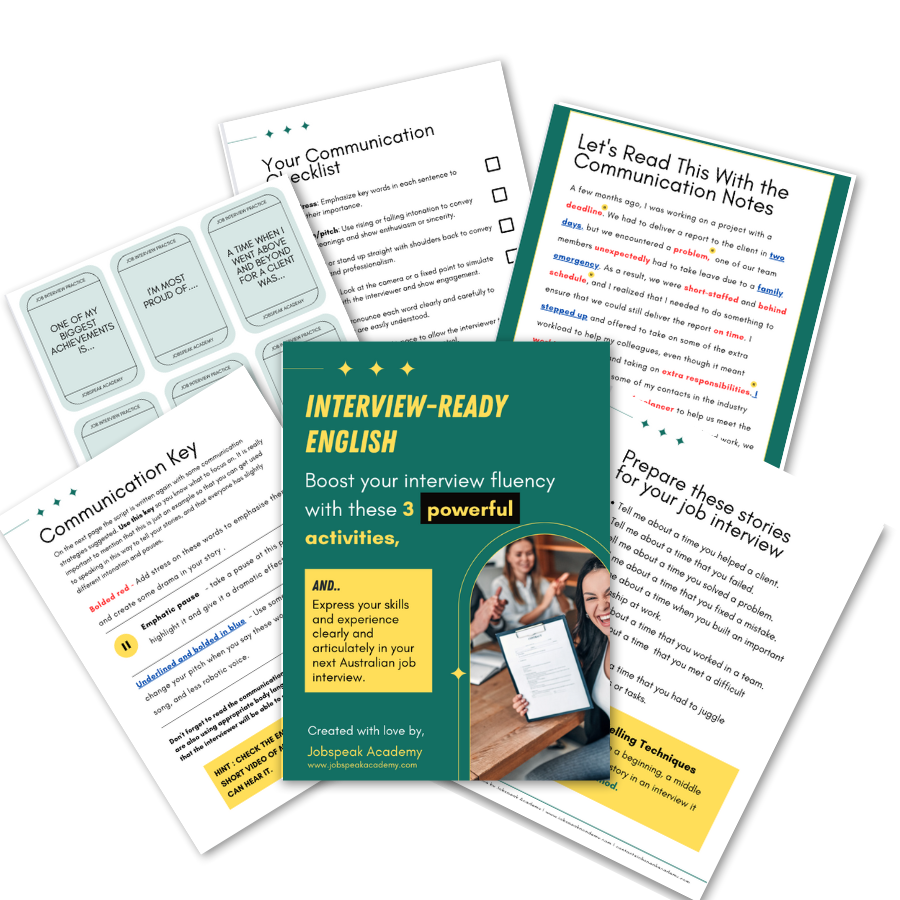A job interview in Australia is one of the most nerve-wracking experiences, it is like we are putting on a show, and we have to wrack our brains for the skills and characteristics that we think the employer wants.
If English isn’t your first language, it is even harder, so it’s no wonder that many people want to memorise their interview answers. I understand, I do. You are nervous, you are afraid of the uncertainty, and you want the interview to be perfect.
You want to perform your best at the interview and show an employer what you can do. The easiest way to do that? To spend hours writing scripts of the most common interview questions so that you know exactly what to answer.
Am I right? Have you done this before? If you have, you aren’t alone.
The problem with memorising your answers is that it isn’t authentic, it makes you feel more nervous, and you won’t be able to handle unexpected questions.
I am a Career and Communication Coach for international professionals in Australia. Here, I tell you four reasons why you shouldn’t memorise your interview answers and what you should do instead.
1. Australian employers love authenticity
Australians prefer direct and clear communication. Interviewers like concise and straight-to-the-point answers that directly address the questions asked. Australians also tend to value honesty and authenticity, so it’s important to be genuine in your responses rather than trying to say what you think the interviewer wants to hear. Australians also tend to prefer a more relaxed and informal communication style compared to some other countries.
When you try to memorise your answers, you won’t be concise, clear, or genuine. You will simply sound like someone who is speaking from a script. And, more often than not, you will forget words and ramble, which will make your answers longer and not concise at all.
2. You won’t show your personality
As we know, Australians value authentic communication. But why? Well, they want to see your personality. Michael Page, a major recruiter in Australia, reported that 84 per cent of hiring managers made a hiring decision based on a cultural fit. What that means is that they will decide if you will be a good team player in their team. The problem with memorising your answers and sounding like a robot (#sorry 🤖) is that you won’t show your personality. They will know that you aren’t authentic, and you won’t be hired because they cannot see who you really are.
3. It’s impossible to guess every question
I create simulated interview experiences for my clients, and this takes a lot of research on the job advert, the company, and the industry to create a list of questions that are likely to be asked. The problem is, I can never predict every question. And neither can you. So, what happens when you are asked a question that you haven’t memorised?
When you try to answer, you may start to say words that don’t really answer the question because you are so nervous and haven’t considered the unexpected. You see that the interviewer is confused and not following your answer, making you even more nervous. Then, for the rest of the interview, you cannot answer properly because you’re stressed. It is so important to be flexible and be able to answer any question that you are asked.
4. Trying to translate memorised answers to English is HARD
Ever tried translating those memorised answers from your native language into English? Let’s be honest, it’s a bit tricky. You’re nervous and struggle to remember the exact words that you wrote down, your thoughts are dancing in your head, and you’re struggling to translate quickly enough. The interviewer is looking at you with confusion and from then on, you lose confidence.
What should you do instead of memorising your answers?
Learn about YOU!
No one knows your career story better than you. So, throw the script aside and spend the time diving into your own personal career story.
I promise you that if you spend the time and energy doing a skills analysis – which allows you to identify your soft skills, transferable skills, characteristics, strengths, and achievements – and brainstorming stories to demonstrate your abilities, you will feel so much more confident. The more confident you are, the more you’ll be able to express yourself articulately and authentically.
And don’t forget that authentic communication means making a few grammar mistakes, asking the interviewer to repeat a question, and using simple vocabulary. It doesn’t have to be complicated. If you do this, they will see the personality behind your answers.
If you want to practise your interview techniques at home, including brainstorming your career stories and boosting your communication skills, then download my free activity guide below. This will help you understand the questions and build your communication skills so that you can be authentic and concise in your interviews.





